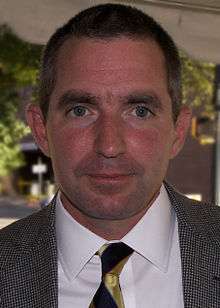C. J. Chivers
| C.J. Chivers | |
|---|---|
 | |
| Born |
Christopher John Chivers 1964 (age 51–52) Binghamton, N.Y. |
| Occupation | journalist, Marine (retired) |
| Agent | Stuart Krichevsky Literary Agency |
| Notable credit(s) |
The New York Times, Esquire, Foreign Affairs, Wired, Military History Quarterly, Providence Journal, Field & Stream, Salt Water Sportsman, Surfer 2007 Michael Kelly Award winner |
| Religion | Roman Catholic |
| Spouse(s) | Suzanne Keating |
| Children | five children |
| Website | http://cjchivers.com |
Christopher John Chivers (born 1964), is an American journalist and author who reports for The New York Times. In the summer of 2007, he was named the newspaper's Moscow bureau chief, replacing Steven Lee Myers. He won a Pulitzer Prize in 2009 as part of a team of New York Times reporters and photographers awarded for their dispatches from Pakistan and Afghanistan. His book, The Gun, a work of history published under the Simon & Schuster imprint, was released in October, 2010.
Chivers attended the school of Arts and Sciences at Cornell University. At Cornell, Chivers played Defensive Line for Sprint Football all four years, and was a member of Alpha Tau Omega fraternity. After graduating in 1987 from Cornell, Chivers served as an infantry officer in the U.S. Marine Corps until 1994. He graduated from the United States Army's Ranger School, served in the first Gulf War and in peacekeeping operations during the Los Angeles riots in 1992 before being honorably discharged as a captain.[1]
Following graduation from Columbia University Graduate School of Journalism, Chivers reported for the Providence Journal on the Providence city government from 1995[2] to 1999.[3]
For the Times, Chivers covered the New York Police Department from 1999 to 2001, when he became a foreign correspondent. He has reported from Afghanistan, Israel, Iraq and all of the former Soviet nations. In Russia he has covered Chechnya and Beslan. In Uzbekistan, he covered the Andijan massacre in 2005.
In 2010 his work in The Times from Afghanistan and Iraq, with that of the reporter Dexter Filkins and the photographer Tyler Hicks, was recognized by New York University as one of the Top Ten Works of Journalism of the Decade. As in those conflicts, the improvised weapons and munitions of Sunni Islamists was an important focus of his reporting on Libya in 2011 and on Syria in 2012.[4]
In 2013 Chivers published an article in the New York Times about the ordeal of Matt Schrier as hostage in the hands of Syrian rebels while Schrier's cellmate Peter Theo Curtis still was held captive. Chivers disclosed that Curtis had helped Schrier escape, putting Curtis in jeopardy and delivering him to abuse by his kidnappers.[5][6]
Awards
1997
In 1997, Chivers received the Livingston Award for International Reporting for a series published in the Providence Journal-Bulletin on the collapse of commercial fishing in the North Atlantic.[7]
2002
Two of Chivers' stories from Afghanistan were cited in the 2002 Pulitzer Prize for Public Service.
2004
With Steven Lee Myers, Chivers received a citation for best newspaper reporting from abroad from the Overseas Press Club for coverage of the 2004 Beslan school hostage crisis in the Times.
2007
Chivers is the recipient of the 2007 Michael Kelly Award and the National Magazine Award For Reporting for his reconstruction of the 2004 Beslan school hostage crisis written for Esquire magazine.[8] That Esquire article has been optioned for a feature film by Imagine Entertainment.[9] He is also the 2007 winner of the Jesse Laventhol Prize for Deadline Reporting, awarded by the American Society of Newspaper Editors for his account in the Times of a Navy corpsman's efforts to save a Marine wounded by a sniper in Anbar Province, Iraq.[10]
Chivers won the 2007 Golden Verb award for excellence from MediaSoyuz, a Russian journalism society, for coverage of Chechnya and an honorable mention from the Overseas Press Club for best newspaper reporting from abroad, for "Marines in Iraq."
2009
Chivers was part of a team awarded the Pulitzer Prize for International Reporting.
Books
- C. J. Chivers (2010). The Gun. New York: Simon & Schuster. ISBN 0-74327-07-6-2.
Personal
In 2008 he, his wife, and five children returned to the United States from Russia. Chivers and his family reside in Rhode Island.
Notes
- ↑ MediaBistro.com - Spotlight: C.J. Chivers Accessed 12 April 2007.
- ↑ Providence Journal-Bulletin: The Power of Words: Chris Chivers bio Accessed 12 April 2007.
- ↑ Providence Newspaper Guild to Belo chief Robert Decherd from NY Times reporter Chris Chivers Accessed 12 April 2007.
- ↑ We Have Found the Enemy and He Is Us
- ↑ C. J. Chivers: American tells of odyssey as prisoner of syrian rebels, The New York Times, August 22, 2013
- ↑ Bastian Berbner: Die Hölle, das ist der andere, Die Zeit Nº 35, 2015
- ↑ "Library: Empty Nets: Atlantic Banks in Peril (series)". University of Michigan. Wallace House. Retrieved 2 October 2016.
- ↑ The Michael Kelly Award
- ↑ http://news.bbc.co.uk/2/hi/entertainment/4992852.stm Hollywood to film Beslan tragedy
- ↑ ASNE recognizes excellence in writing, photography Accessed 23 April 2007.